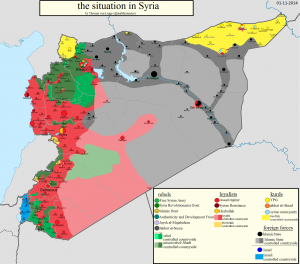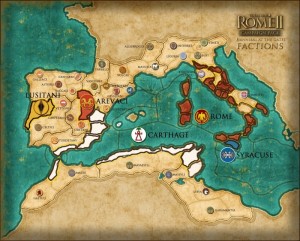As the Syrian War unfolds before the world, as anarchy, disarray, and unrestrained violence becomes ever more commonplace on Syrian soil, we must ask ourselves, “How could this have happened?” It is undoubtedly difficult to even consider the fact that this horrible series of conflicts, broadcasted constantly on our TVs and becoming ever clearer from the cockpits of American bombers, is not the first of its kind. Unfortunately, if modern nations do not take a hint from the empires of old, it will not be the last.
“The Syrian War” is a term used to describe the current conflict in Syria, which has come to involve a complicated variety of engagements and the combined forces of over twelve nations. The Syrian War began as the Syrian Civil War, in which rebel forces rose up against the regime of Syrian President Bashar al-Assad over four years ago.
The United States has since allied itself with the rebel forces, offering air support, supplies, and military training in an effort to topple the Assad regime. The military forces of Turkey, Saudi Arabia, and other Arab states have similarly joined the rebel cause. The Syrian government under Assad is not without allies, however. Assad has enlisted the support of Russia, Iran, Hezbollah militants, and local loyalist militias. This war has raged for over four years and has resulted in thousands of casualties.
This conflict would be enough on its own, yet with the Islamic State (ISIS) added into the mix, the situation becomes as complicated as it is deadly.
The American-backed rebels have no interest in combating the ever-advancing Islamic State, who have ravaged the Syrian countryside, but are focused on bringing down the Assad regime. Meanwhile, the United States is openly assaulting ISIS positions while supplying its rebel allies. Kurdish militants have also been coordinating attacks with the United States against the Islamic State, but this has only increased tensions between the United States and Turkey, which has fought deadly war upon deadly war against Kurdish separatists. The tensions do not stop there, however, as Saudi-Arabian-backed militant forces have squared off against Iran and Hezbollah-backed loyalist troops, thus increasing the already apparent
turmoil in the Middle East.

The situation only worsened once Russia began launching airstrikes in Syria as of September of this year. Russian cruise missiles are targeting not only ISIS positions but also American-backed rebel groups battling the Assad regime. Accordingly, this has increased tensions between the United States and Russia; they have only recently signed a shaky pact as of October 20 regulating both nations’ airstrikes within Syrian territory.
As of January 2015, the United Nations estimated that over 220,000 people had died over the course of the Syrian War. Unfortunately, this death toll has only increased, and exponentially so.
With a death toll exceeding 220,000 people, it may be hard to believe that the world has ever seen such a complicated and deadly conflict, especially the ancient world.
Yet the first-ever Syrian War began in Saguntum, an ancient Iberian settlement that is now the small town of Sagunto on the southeastern coast of modern day Spain. It was the siege and consequent destruction of this settlement that brought about the Second Punic War, the conflict which would establish Rome as an international superpower.
Following the First Punic War between the Carthaginian Empire, based out of modern-day Tunisia, and the Roman Empire, based out of, well, Rome, these two powers held an uneasy peace. While Rome and its allies had the Italian peninsula firmly under their heel (get it, Italy looks like a boot), as well as the island of Sicily to the South, Carthage commanded firm control of the African coast, a large portion of the southeastern portion of Iberia (modern-day Spain), and the Balearic Isles.

Yet beyond their personal territorial holdings, both Rome and Carthage had a variety of allies across the Iberian Peninsula. For instance, Carthage held the Iberian tribes of the Oretani, Turdetani, and Illervacones as client states. Carthage also held some uneasy relationships with the major Iberian tribes of the Lusitani and Arevaci. Hannibal Barca, the general who spearheaded the Second Punic War, regularly bolstered his forces with Lusitanian and Arevacian troops.
Rome similarly had no shortage of allies. The Greek city states of Massilia (modern Marseilles) and Emporion (near modern Catalonia) on the Iberian coast were dedicated military allies of Rome. Many small Iberian tribes were also loyal to Rome, as they sought the lucrative trade agreements that came with such alliances. One such Iberian tribe were the Sagunti, who occupied the city of Saguntum.
Much like Syria, ancient Iberia was a powder keg of complicated hostilities and alliances just waiting for a spark. That spark was embodied in Hannibal Barca, the leader of the Carthaginian cause. After the Roman-backed Sagunti were accused of conducting raiding parties against the Carthaginian-backed Oretani, Hannibal took the situation into his own hands and captured the city of Saguntum, plunging the entirety of Iberia, Africa, and Spain into war.
This war would last for nearly twenty years, resulting in an estimated 650,000 militant deaths alone, not including civilian casualties.
Once again, history has shown itself to be cyclical. In modern Syria, we see a bloody mix of varying intentions and internationally-backed militant groups, just as we did in ancient Iberia. While we do not know how the Syrian conflict will end, we can be certain that the same formula resulted in hundreds of thousands of deaths in the ancient world.
I will leave you with the thought-provoking notions of American literary theoretician Henry W. Said and his notion of imperialism,
“Every empire, however, tells itself and the world that it is unlike all other empires, that its mission is not to plunder and control but to educate and liberate.”
Lee Shaw is a sophomore BIC student majoring in professional writing and the current editor of the QuickBIC.
Further reading on Iberia in the Second Punic War:
http://www.forumromanum.org/history/morey15.html
Further reading on the Syrian War:
http://www.huffingtonpost.com/2015/01/15/syria-rebel-truce_n_6478226.html?ncid=txtlnkusaolp00000592
https://www.rt.com/news/319198-russia-us-syria-agreement/